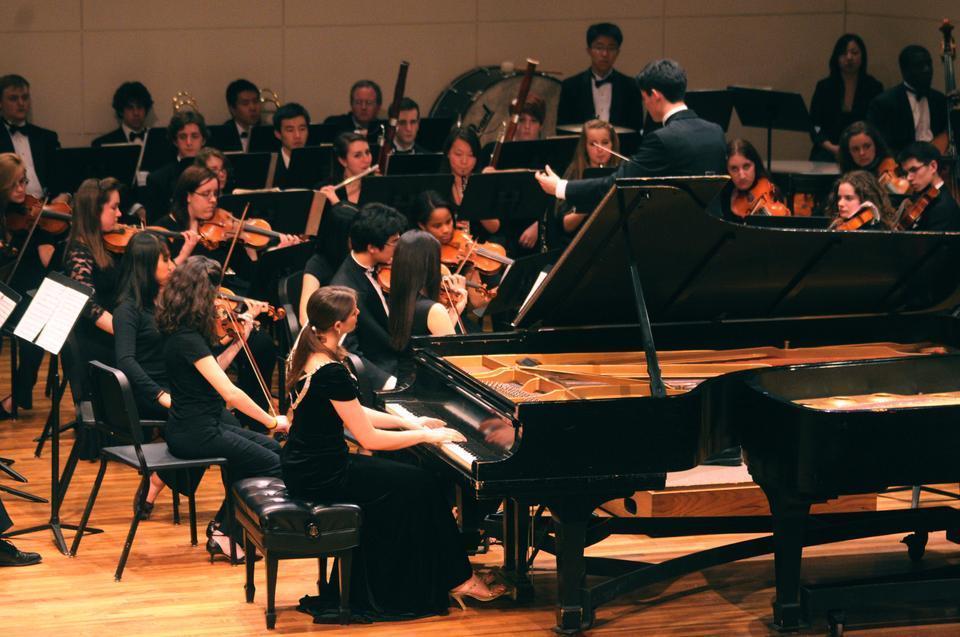
News
Summers Will Not Finish Semester of Teaching as Harvard Investigates Epstein Ties

News
Harvard College Students Report Favoring Divestment from Israel in HUA Survey

News
‘He Should Resign’: Harvard Undergrads Take Hard Line Against Summers Over Epstein Scandal

News
Harvard To Launch New Investigation Into Epstein’s Ties to Summers, Other University Affiliates

News
Harvard Students To Vote on Divestment From Israel in Inaugural HUA Election Survey
'Scenes' Jazzes Up BachSoc

The Bach Society Orchestra (BachSoc) gave its third performance of the season this past Saturday in Paine Hall. Under the baton of Yuga J. Cohler ’11, BachSoc presented Prokofiev, Poulenc, Mozart, and the premiere of “Nightclub Scenes,” a student piece created for the orchestra’s annual composition competition. Because of its modest size, the performance was intimate and inviting, maintaining a high standard throughout.
The evening began with Sergei Prokofiev’s Symphony No. 1 in D major. The piece established the neo-classical flavor of the night’s first three works with sweeping, sometimes dissonant harmonies punctuated by pizzicato and sharp percussion. Cohler presented the third and fourth movements with an especially tasteful choice of tempi that allowed his musicians to end the piece with a rapid, energetic flourish.
This energy continued into Francis Poulenc’s Concerto for Two Pianos and Orchestra in D minor, which featured 2009-10 Concerto Competition Winners Stephanie J. Brinton Parker ’10 and Lindsey R. Brinton ’12, who are sisters. The challenge of piano four hands is daunting for even accomplished pianists, but the sisters complemented each other’s performances both in terms of technique and stylistic expression. The interplay between them was so precise that it was difficult to tell which pianist was playing which phrase, creating a truly seamless piano performance. Though Poulenc rose to fame in France as an avant-garde composer in the early 1900s, he was an artist before his time. A century later in Paine Hall, his piano concerto still sounds dashingly innovative.
BachSoc then presented the highly anticipated premiere of 2009-10 Composition Competition Winner “Nightclub Scenes for Solo Piano and Orchestra,” by Zachary T. Sheets ’13. Though “Nightclub Scenes” fit nicely with the modern sound of Prokofiev and Poulenc, there was a distinctively jazzy, almost sultry feel to Sheets’s composition. Written as “a classically inspired piece with a sense of harmony rooted in jazz,” Sheets delegated the roles of the jazz band’s walking bass, tenor saxophone, and trumpet to the cello, viola, and violin, respectively. Tying the piece together was pianist Jennifer Chen ’11, whose performance evoked the mysterious sophistication of a nightclub. Sheets enraptured his musicians and audience alike, with the orchestra coming alive as they played his work.
Concluding the evening with Mozart’s Symphony No. 35 in D major, or the Haffner Symphony, BachSoc revealed the careful attention it paid to its selection of the evening’s works. The Haffner Symphony was a surprising segue from “Nightclub Scenes,” as it celebrated the classical period that influenced Prokofiev and Poulenc’s modern works. With Cohler conducting, BachSoc ended the Haffner Symphony with the exuberance that this work demands, as a final display of the refined sound that the orchestra conveyed throughout the night.
Want to keep up with breaking news? Subscribe to our email newsletter.
